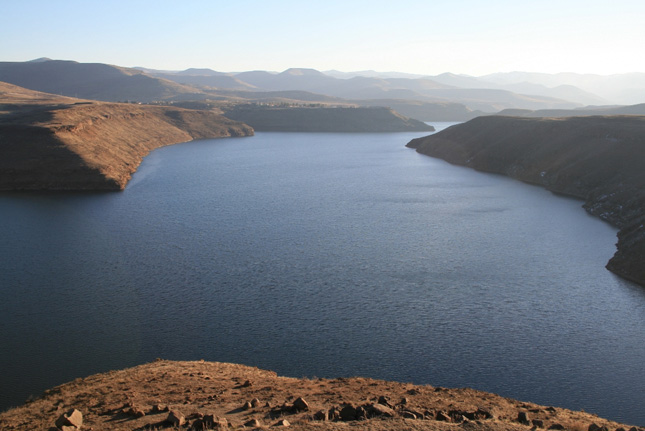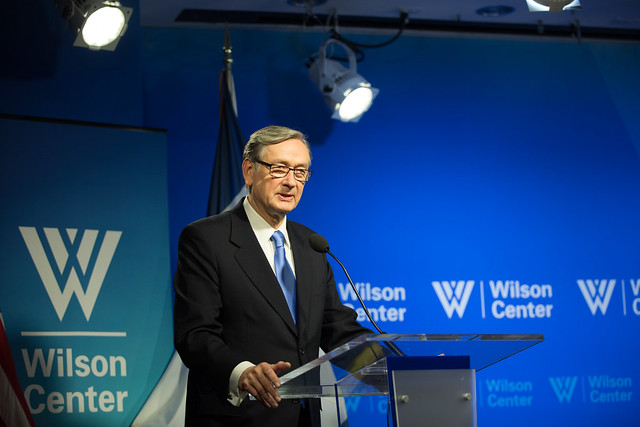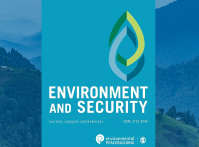-
A Matter of Survival: Learning to Cooperate Over Water
February 1, 2018 By Ellie Anderson
“Water security and management represent the cornerstone of global conflict prevention,” said President Danilo Türk, chair of the Global High-Level Panel on Water and Peace and former president of Slovenia, at a recent Wilson Center event on water and peace. “The only alternative to water is water, and therefore, the matter of water is a matter of survival,” said Sundeep Waslekar, president of Strategic Foresight Group.
In 2015, 15 UN Member States formed the high-level panel to explore the links between recent water problems and armed conflicts. Using a nexus approach—because “water issues do not exist in isolation,” said Türk—the panel produced a report, A Matter of Survival: Learning to Cooperate Over Water, with recommendations for policymakers.
Securing Water Supplies for Peace and Security
The past 5 years saw more attacks on water infrastructure than in the first 10 years of the 21st century, said Waslekar. Water “has been manipulated—it’s been used by terrorists—and in that sense, there is a need to…take concrete action to fix it,” said Ambassador Paula Dobriansky, vice chair of the U.S. Water Partnership National Executive Committee.
Lack of access to safe drinking water and sanitation can “increase migration pressures, promote civil unrest, and contribute to terrorist recruitment,” said Aaron Salzberg, special coordinator for water resources for the U.S. Department of State. Millions of people experience water stress globally, and that problem extends beyond the local level. “As water resources become scarce, confrontation will increase, and this will exacerbate tensions in already conflict-prone regions of the world,” said Salzberg.
“Two million people in Gaza have run out of drinking water. The fact that two million Palestinians don’t have any security for their basic water needs is a threat to the national security of the Palestinian Authority, of Israel, of Egypt, and the broader Middle East,” said Gidon Bromberg, Israeli director of EcoPeace.
We’re in the Same Boat: Cooperating Over Shared Water
Water insecurity can create the enabling conditions for conflict, but it can also be leveraged for peace, said Türk. “Peace in our era means much more than mere absence of war among states. Peace today requires strong and sophisticated tools for security and cooperation,” he said.
“The realization that we’re literally in the same boat together has motivated some change.”In the Palestinian territories, Jordan, and Israel, people cooperate to share water supplies, because the lack of water in one place can influence the security and health of its neighbors. “You can’t disconnect from a shared environment,” said Bromberg. “The realization that we’re literally in the same boat together has motivated some change.”
Cooperation at the local level can extend to political leaders. “If you can build the spirit of cooperation up at those levels, you’d be amazed at the political will that can create among national leaders to then take the steps that are necessary to reach an agreement,” said Salzberg.
But to ensure cooperation works, water policymakers must resolve unequal access to water. “Have you solved the problem of the inequities that might exist over the use of that water at the lowest level? Is the farmer at the end of the irrigation canal going to get any water?” said Gerald Galloway, a retired brigadier general, and member of the CNA Military Advisory Board
“Unilateralism cannot work. Only focusing on control, without focusing on fair share also, will not create the right motivation to deal with solving transboundary issues,” said Bromberg.
Essential Ingredients: Funding, Data, and Education
In West Africa, countries are “moving from politics to policies…but the policy also has to come with funding to be able to roll it out,” said Mike Hammah, Ghana’s former minister for natural resources. While joint investment plans have been successful in transboundary river basins in Central America, and in West and East Africa, more funding is needed for different types of projects, not just for infrastructure, said Alvaro Umaña Quesada, Costa Rica’s former minister of energy and environment.
Data sharing is also vital. “You can’t deal with these sorts of issues unless everybody is at the table with the same information,” said Galloway. Data can then be used “in service of greater hydrodiplomacy in key strategic regions,” said Sherri Goodman, senior fellow at the Wilson Center and member of the U. S. Water Partnership National Executive Committee.
In fragile regions, people from the same basin should come together “to learn about their interdependencies,” said Bromberg, and to understand that “political borders don’t stop the spread of disease or sewerage.”
Informing Policymakers to Act Now—And Together
Leaders are not taking water issues as seriously as they need to, said Bromberg, so “we need to be the loudest voices in the room to help our leaders make these critical decisions that we need to promote the objectives of a more water-secure, water-fair world.”
“Water is a web that spreads throughout every bit of society,” said Galloway. “Leaders must know and understand the risks they face in the future with water.”
Ultimately, the goal is a water-secure world: “a world where people have sustainable supplies of water in sufficient quantity and quality to meet human, economic, and ecosystem needs, while managing the risks from floods and droughts,” said Salzberg.
“We have shared responsibility, and there is nothing we can just handle on our own,” said H.E. Pio Wennubst, assistant director-general of the Swiss Agency for Development and Cooperation.
Sources: Geneva Water Hub, The Guardian
Photo Credit: The Orange-Senqu Basin in South Africa, July 2009, courtesy of USAID in Africa
 A Publication of the Stimson Center.
A Publication of the Stimson Center.







